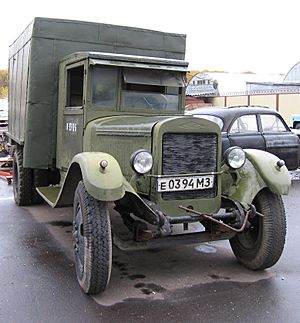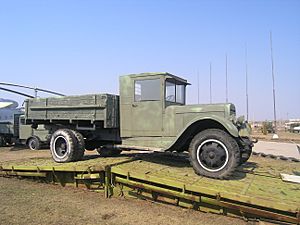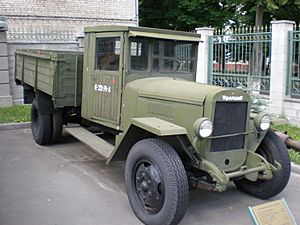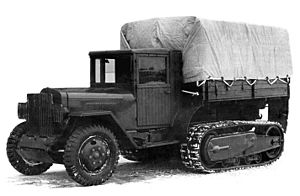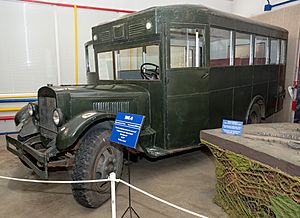ZIS-5 (truck) facts for kids
Quick facts for kids ZIS-5 |
|
|---|---|
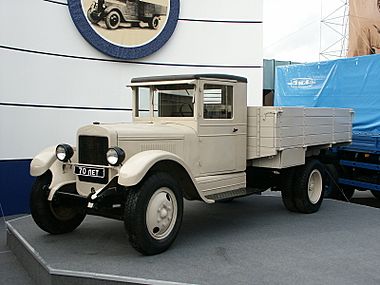 |
|
| Overview | |
| Manufacturer | ZIS |
| Also called | UralZiS-355 |
| Production |
|
| Assembly | Moscow |
| Body and chassis | |
| Class | Truck |
| Layout | FR |
| Related | ZIS-6 Autocar SD |
| Powertrain | |
| Engine | 5.6L ZIS-5 I6 |
| Transmission | 4-speed manual + 2-speed gearbox |
| Dimensions | |
| Wheelbase | 3,810 mm (150.0 in) |
| Length | 6,060 mm (238.6 in) |
| Width | 2,235 mm (88.0 in) |
| Height | 2,160 mm (85.0 in) (cabin) |
| Weight | 3,100 kg (6,834 lb) |
| Chronology | |
| Predecessor | AMO-3 |
| Successor |
|
The ZIS-5 was a very important truck made in the Soviet Union. It was produced by the ZIS factory in Moscow from 1932 to 1948. This tough 4x2 truck became a true workhorse, especially during World War II. It was known for being simple and reliable.
Contents
How the ZIS-5 Truck Was Developed
In 1931, a truck factory in Moscow called AMO got new equipment. It started making a truck called the AMO-2. This truck was meant to replace an older model, the AMO-F-15. The AMO-F-15 was the first Soviet truck ever built.
The AMO-2 and AMO-3 trucks were based on designs from an American company, Autocar. In 1933, the AMO factory was updated again. It was renamed "Zavod Imeni Stalina," or ZIS for short. That summer, the AMO-2 and AMO-3 trucks were improved. They were then given the new name: ZIS-5.
The ZIS-5: A Key Truck in History
The ZIS-5 truck started being made in large numbers on October 1, 1933. It quickly became very popular. Along with another truck called the GAZ-AA, the ZIS-5 was one of the most important Soviet trucks from the 1930s to the 1950s.
It was also a vital vehicle for the Soviet military. When World War II started, the Soviet army had over 100,000 of these trucks.
Where ZIS-5 Trucks Were Made During the War
When Germany invaded in 1941, the ZIS factory in Moscow had to stop making trucks. The production lines were moved to other cities. These cities were Ulyanovsk and Miass.
Production in Ulyanovsk lasted from 1942 to 1944. In Miass, trucks were made from 1944 until 1955. Meanwhile, the Moscow ZIS plant started making trucks again in April 1942. They continued until 1948.
The ZIS-5V: A Simpler War Version
By the end of 1941, there were not enough materials because of the war. This meant the ZIS-5 truck had to be made simpler. The goal was to use fewer materials and make them faster.
Changes to the ZIS-5V Model
- The round metal fenders were replaced with flat, bent ones.
- The driver's cab and footboards were made from wood instead of metal.
- Brakes were removed from the front wheels.
- The back gate of the truck bed could only swing open.
- Sometimes, one of the headlights was removed.
- Bumpers were often left off.
This simpler model was called the ZIS-5V. It was made starting in May 1942 in Ulyanovsk. Later, it was also produced in Moscow and Miass. About 1 million ZIS-5 trucks were made in total by all factories.
How the ZIS-5 Was Used
During World War II, the ZIS-5 was used on all battlefronts. Soldiers really liked it because it was simple and very reliable.
Many Jobs for One Truck
The ZIS-5 did many jobs:
- It carried supplies and cargo.
- It pulled light artillery guns.
- It transported soldiers. Up to 25 soldiers could sit in the back.
- It was also used to build special trucks. These included fuel trucks, mobile workshops, ambulances, and anti-aircraft gun platforms.
After the GAZ-AA, the ZIS-5 was the second most used truck in the Soviet army from 1933 to 1943. Soldiers called it the "Tryohtonka," which means "three-tonner," because it could carry 3 tons of weight.
The ZIS-5 was especially important on the "Road of Life." This was the only way to get supplies to the city of Leningrad when it was under siege. The road was on the frozen surface of Lake Ladoga during the winters of 1941–1944. The truck also had the nickname "Zakhar."
ZIS-5 Trucks Around the World
The ZIS-5 was the first Soviet vehicle to be sold to other countries. In 1934, 100 trucks were sold to Turkey. Other countries that bought ZIS-5 trucks included Afghanistan, Iraq, Iran, Spain, China, and several countries in Europe.
Some ZIS-5 trucks were also captured and used by other armies. For example, Finnish soldiers captured some during the Winter War (1939–40). German soldiers also used captured ZIS-5 trucks after they invaded the Soviet Union in 1941.
Different Types of ZIS-5 Trucks
The ZIS-5 was a very versatile truck. Many different versions and related vehicles were made based on its design. Here are some of them:
- ZIS-5: This was the standard truck version.
- ZIS-5V: This was the simpler version made during the war.
- ZIS-6: A version with three axles instead of two.
- ZIS-8: A bus version.
- ZIS-10: A version designed to pull trailers.
- ZIS-11: A longer version, often used for fire trucks.
- ZIS-12: Another long version for special uses. One variant, the ZIS-12 (94-KM), had anti-aircraft guns.
- ZIS-19: A dump truck version.
- ZIS-21: A version that ran on wood gas instead of gasoline.
- ZIS-22: A half-track version, meaning it had tracks at the back and wheels at the front.
- ZIS-32: A version with four-wheel drive.
- ZIS-42: Another half-track version.
- ZIS-44: An ambulance version based on the ZIS-5V.
- ZIS-50: An updated ZIS-5 with a new engine.
Specifications of the ZIS-5 Truck
- Type: 4x2, 2-axle, 3-ton cargo truck
- Total Produced: About 1 million units
- Engine: 6-cylinder, water-cooled engine. It had 73 horsepower at first. Later versions had more power.
- Length: 6,060 mm (238.6 in)
- Height: 2,160 mm (85.0 in)
- Width: 2,235 mm (88.0 in)
- Wheelbase: 3,810 mm (150.0 in)
- Transmission: 4-speed manual
- Weight: 3,100 kg (6,834 lb) (empty)
- Top Speed: 60 km/h (37 mph). Later models could go up to 70 km/h (43 mph).
- Fuel Use: About 34.0 liters per 100 kilometers.
See also
 In Spanish: ZIS-5 para niños
In Spanish: ZIS-5 para niños
- Katyusha rocket launcher


